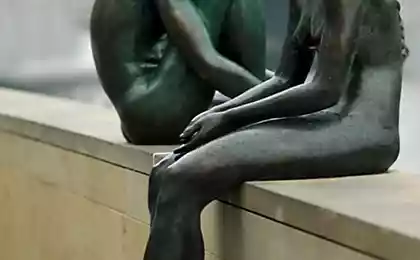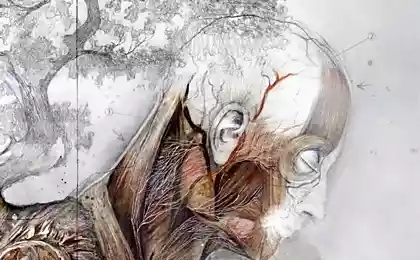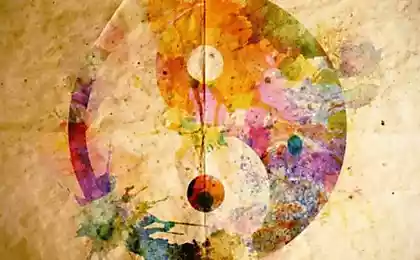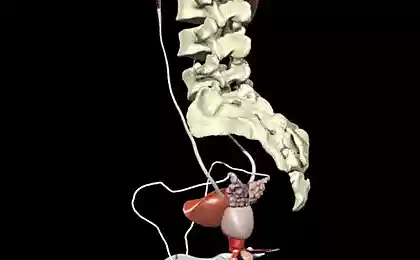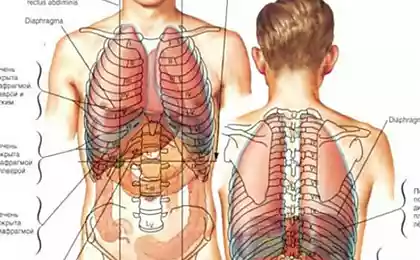494
Emotions, the existence of which we do NOT suspect
Fear or attraction? Happiness or impact? Anger or peace?
Scientist cognitivist, author of the book "Theory of attraction" Jim Davis briefly explains how invisible forces affect our unconscious, our unconscious affects our mood and why emotions arise, which we are not aware of.

What does it mean to have emotions? It seems obvious that having emotions means to feel them. If you are happy, but do not know in what sense you may be actually happy? It seems that such reflections were heard from William James*
*American psychologist, Creator of one of the first theories in which subjective emotional experience is correlated with physiological functions
Conscious feeling, he believed, is what distinguishes emotion from other mental States, such as desires. He wrote that without a conscious sense of "we believe that we have nothing left behind, no "mental substance" out of which emotion can be educated." Sigmund Freud agreed:
"The essence of emotion that we should feel it, i.e. that it should enter consciousness."
But emotion is a complex thing. Even if we experience emotions, there are details associated with them, which we usually do not know.
Clinical psychologists, for example, is recommended for patients experiencing problems with uncontrolled anger, look for the warning signs — for example, sweating in the palms or spasm of the jaw, so that they could mitigate the attack the approaching wrath. And when we are frightened or sexually excited, the rhythm of our hearts and breathing rate increase without our knowledge (although we can recognize the change, if you focus attention on it). Moreover, the fear seems to be hidden are able to enhance sexual arousal — or be mistaken for it.
Consider one study in 1974. The scientists used the attractive female interviewers, which were to poll a group of men: one conducted a survey among men, crossing the dangerous suspension bridge, and the other interviewed group crossing a bridge that was not scary or dangerous. Women asked men to fill in the questionnaire. People on the "dangerous" bridge answered questions with more sexual overtones and was more inclined to contact the female interviewer after the questionnaire. This suggests that people in frightening bridge (unconsciously) interpreted the reaction of the organism to danger as an additional attraction to the woman.
But how can you demonstrate unconscious emotion in action? We know that emotions affect us. When we are in a good mood, for example, we all like it more. If you find a situation in which emotion has the predicted effect, but the people we watch are not aware of the appearance of the predicted emotions, then we could step on something.
This is what psychologists Peter Winkelmann and Kent Berridge tried to do. In their 2004 experiments, they showed participants images of happy and sad faces, but tried to influence the subconscious is showed pictures so fast that the respondents could not on a conscious level to understand that they all show the faces. Then they had the task to drink a new lime-lemon drink and rate it. When subjects were asked how they felt, it was clear that they had no conscious awareness of any changes of mood. But the people who were shown happy faces, not only appreciated the drink is better than the other test subjects, and they drank it more!
Why some unconscious forms of happiness affect us? As noted by Winkelmann and Berridge, "from the point of view of evolution and neuroscience, there is good reason to believe that at least some forms of emotional responses can exist independently" of our consciousness.

"Speaking from the point of view of evolution, the ability to have conscious feelings, probably later achievement."
Perhaps emotions exist only because they work without conscious processing. Scientists say:
"The original function of emotion is to allow the body to respond appropriately to" good and bad things in life, and "conscious feelings, may not always have been necessary."
Indeed, research conducted in 2005, showed the difference in conscious and unconscious patterns of fear in the brain. The researchers believe that it will help us to understand the mechanisms underlying the emergence of fear after injury, which, as they say, is "automatic and not directly amenable to conscious control."
Also interesting: Sandero and 22 of the emotions that we feel but can't explain How the pain is related to Your emotions
When we start to think about it, it ceases to seem strange that unconscious emotions are expressed implausible. In the end, who among us has not heard someone sullen screams: "I'm not angry!".published
P. S. And remember, just changing your mind — together we change the world! ©
Source: monocler.ru/neizvestnie-emotsii/
Scientist cognitivist, author of the book "Theory of attraction" Jim Davis briefly explains how invisible forces affect our unconscious, our unconscious affects our mood and why emotions arise, which we are not aware of.

What does it mean to have emotions? It seems obvious that having emotions means to feel them. If you are happy, but do not know in what sense you may be actually happy? It seems that such reflections were heard from William James*
*American psychologist, Creator of one of the first theories in which subjective emotional experience is correlated with physiological functions
Conscious feeling, he believed, is what distinguishes emotion from other mental States, such as desires. He wrote that without a conscious sense of "we believe that we have nothing left behind, no "mental substance" out of which emotion can be educated." Sigmund Freud agreed:
"The essence of emotion that we should feel it, i.e. that it should enter consciousness."
But emotion is a complex thing. Even if we experience emotions, there are details associated with them, which we usually do not know.
Clinical psychologists, for example, is recommended for patients experiencing problems with uncontrolled anger, look for the warning signs — for example, sweating in the palms or spasm of the jaw, so that they could mitigate the attack the approaching wrath. And when we are frightened or sexually excited, the rhythm of our hearts and breathing rate increase without our knowledge (although we can recognize the change, if you focus attention on it). Moreover, the fear seems to be hidden are able to enhance sexual arousal — or be mistaken for it.
Consider one study in 1974. The scientists used the attractive female interviewers, which were to poll a group of men: one conducted a survey among men, crossing the dangerous suspension bridge, and the other interviewed group crossing a bridge that was not scary or dangerous. Women asked men to fill in the questionnaire. People on the "dangerous" bridge answered questions with more sexual overtones and was more inclined to contact the female interviewer after the questionnaire. This suggests that people in frightening bridge (unconsciously) interpreted the reaction of the organism to danger as an additional attraction to the woman.
But how can you demonstrate unconscious emotion in action? We know that emotions affect us. When we are in a good mood, for example, we all like it more. If you find a situation in which emotion has the predicted effect, but the people we watch are not aware of the appearance of the predicted emotions, then we could step on something.
This is what psychologists Peter Winkelmann and Kent Berridge tried to do. In their 2004 experiments, they showed participants images of happy and sad faces, but tried to influence the subconscious is showed pictures so fast that the respondents could not on a conscious level to understand that they all show the faces. Then they had the task to drink a new lime-lemon drink and rate it. When subjects were asked how they felt, it was clear that they had no conscious awareness of any changes of mood. But the people who were shown happy faces, not only appreciated the drink is better than the other test subjects, and they drank it more!
Why some unconscious forms of happiness affect us? As noted by Winkelmann and Berridge, "from the point of view of evolution and neuroscience, there is good reason to believe that at least some forms of emotional responses can exist independently" of our consciousness.

"Speaking from the point of view of evolution, the ability to have conscious feelings, probably later achievement."
Perhaps emotions exist only because they work without conscious processing. Scientists say:
"The original function of emotion is to allow the body to respond appropriately to" good and bad things in life, and "conscious feelings, may not always have been necessary."
Indeed, research conducted in 2005, showed the difference in conscious and unconscious patterns of fear in the brain. The researchers believe that it will help us to understand the mechanisms underlying the emergence of fear after injury, which, as they say, is "automatic and not directly amenable to conscious control."
Also interesting: Sandero and 22 of the emotions that we feel but can't explain How the pain is related to Your emotions
When we start to think about it, it ceases to seem strange that unconscious emotions are expressed implausible. In the end, who among us has not heard someone sullen screams: "I'm not angry!".published
P. S. And remember, just changing your mind — together we change the world! ©
Source: monocler.ru/neizvestnie-emotsii/
How to cook perfect green DETOX cocktail
STOP words in communicating with children — quickly, efficiently and smoothly



